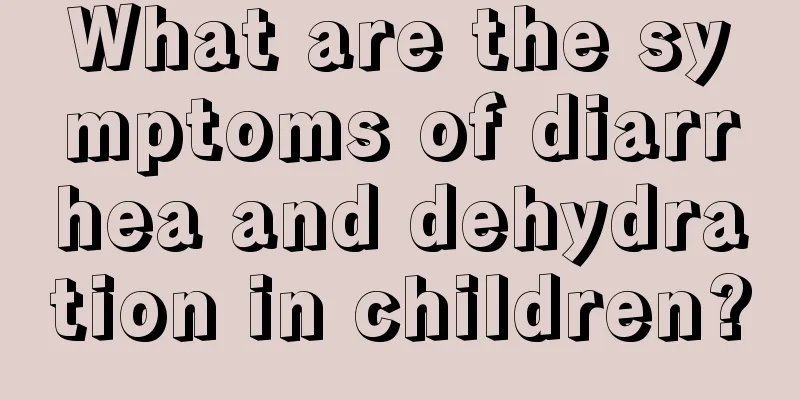What are the symptoms of diarrhea and dehydration in children?

|
Because children often eat randomly and their stomachs and intestines are not fully developed, they are likely to suffer from diarrhea due to careless diet. Children with diarrhea and dehydration need to be paid attention to as it may be related to nutritional absorption disorders. It is necessary to find the appropriate cause for prevention and observe the symptoms in time. What are the symptoms of diarrhea and dehydration in babies? In addition to affecting the body's absorption of nutrients, diarrhea in children also consumes nutrients stored in the body. Especially long-term chronic diarrhea can lead to malnutrition due to increased consumption. In addition, during diarrhea, the viscosity of the small intestine directly affects the absorption of water. Due to the change in osmotic pressure in the intestinal cavity, the water in the blood is transferred to the intestinal cavity and finally excreted through the stool, which causes the body to lose a large amount of water. If the water loss does not exceed 5% of body weight, the body can still compensate; if it exceeds 5%, it cannot, and the body will experience a series of functional disorders, which is often called dehydration. Depending on the degree of water loss in the body, dehydration can be divided into three degrees: mild, moderate and severe. Mild dehydration The amount of water is 5% of body weight (about 50 ml per kilogram of body weight). Due to the decrease in water content in the body, the child will feel a little thirsty, have tears and urine when crying. Examination shows that the child is generally in good condition, with slightly sunken eye sockets, and the skin on the abdomen or inner thighs shrinks quickly after pinching. Moderate dehydration The amount of water is about 5%-10% of body weight (50-100 ml for every gram of body weight). The child is restless and easily irritable; he is thirsty and wants to drink water, and looks for the nipple everywhere. If he gets the bottle, he will suck it desperately; he cries with few tears, and his urine volume and frequency are also reduced; examination shows that the child has sunken eye sockets, dry mouth and tongue, and the skin of the abdominal wall and inner thigh shrinks slowly after pinching. Severe dehydration The amount of water is more than 10% of the body weight (100-120 ml per kilogram of body weight). The child now has extreme mental atrophy, drowsiness, and even coma; the child has very serious stuttering, no tears when crying, and the amount of urine and frequency of urination are significantly reduced. Examination revealed that the child's eye sockets were obviously sunken, and his mouth and tongue were very dry; the skin on the abdominal wall and inner thighs retracted very slowly after pinching. When parents find that their children are dehydrated due to diarrhea, they should first let the children take oral salt supplements and send them to the hospital for diagnosis and treatment in time. |
<<: What should I do if my child has a runny nose due to heat?
>>: Why does a child have a runny green nose?
Recommend
What department should I go to for child development?
Nowadays, many mothers do not know that they shou...
Why does my baby have ringworm on his chin?
Babies are prone to drooling before they are one ...
What are the dangers of scrotal effusion in children?
When children are young, there will always be som...
The child keeps yawning, does it mean he didn't sleep well?
If a child keeps yawning during the day, it means...
There is a small lump on the newborn's chest
Newborns are a very special group. Because their ...
Why does the baby keep crying?
Babies are weak, and many of them cry because of ...
Can 6-month-old babies eat pumpkin?
When the baby grows to 6 months old, the nutritio...
What should I do if my two-month-old baby doesn't like to drink milk powder?
Once their baby shows that he doesn’t like to dri...
What should I do if my child has a cough?
Diseases are very common in people's lives, b...
The child had a fever after taking a bath.
Many people don’t like to bathe children, especia...
Why does a two-month-old baby have blood in his stool?
Nowadays, most families have only one baby, and t...
The child has wheezing breathing
Generally speaking, children's breathing is s...
Is the neonatal jaundice treatment device safe?
Neonatal jaundice treatment devices can treat jau...
Are babies with late teething smart?
Some new parents are particularly anxious about t...
What are the treatments for allergic cough in children?
When allergies occur, coughing is a very common s...









